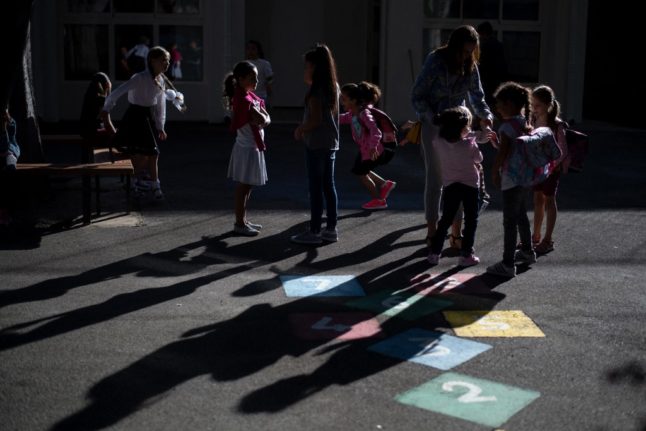 Photo: Twitter/HPouxx
Photo: Twitter/HPouxxBOMB
Who is sending terror threats to Paris’s high schools?
This week has seen a total of eight high schools in Paris evacuated over bomb threats - some of them twice. Although the calls turned out to be hoaxes police were forced to take them seriously.
Published: 29 January 2016 11:32 CET
Photo: Twitter/HPouxx
The schools, most of them public and located in up-market districts of the French capital, were evacuated after the hoax calls were made on Tuesday and Thursday.
A number of schools in Britain and Italy were also threatened, and on Friday two states in Australia were affected too. Schools in Sweden have also been hit by fake terror attack threats.
In each instance the threats have been taken seriously, with schools evacuated, searches carried out and in certain cases bomb squads called in.
Whoever it is who is making the bomb threats remains a mystery, but here is what we know so far.
Which French schools have been targeted?
Tuesday saw evacuations at the lycées Montaigne, Henry IV, Fenelon, Charlemagne, Louis-Le-Grand and Condorcet in Paris.
On Thursday, it was Charlemagne, Condorcet, Louis-Le-Grand – all for the second time – as well as Hélène Boucher, Victor Hugo, and Passy Saint-Honoré. These schools remain guarded by security on Friday.
How are the calls coming through?
On Tuesday, the threats have been via anonymous calls claiming that bombs had been hidden in the buildings, according to police and the Paris school authority.
Then on Thursday the caller reportedly said that they would arrive at the schools armed with “bombs and Kalashnikovs to ensure the maximum amount of victims.”.
The calls are said to have been “virtually identical”, with a police source telling Metro newspaper that the voice is “metallic sounding as if played via a tape recorder”
According to BFM TV's information, the calls are “without doubt” coming from a foreign country that is not in the Middle East. Although the channel added that the calls could have made from France but made to appear like they are coming from abroad using a subterfuge device.
Little is known about how the threats were made to British schools and what was said, although they are understood to have all been via phone too.
In Australia, one school said a receptionist had received a “computerised” message through a phone call which said there was a “bomb in a backpack but no more specifics”.
Have police got any leads?
In the UK, a 14-year-old boy has been held after he was caught on CCTV entering the phone booth from which a bomb threat was called in, but it appears to be an isolated case, reported The Guardian.
The threats in Europe were claimed by a Twitter account calling itself the Evacuation Squad, with a profile picture of Russian President Vladimir Putin.
The account featured previous messages in support of Syrian President Bashar al-Assad.
“We are six individuals based internationally,” read the profile blurb, advertising its services to call in bomb threats.
 Photo: Twitter/HPouxx
Photo: Twitter/HPouxx
The account has since been suspended. The police have yet to give any signs as to whether the account is to be taken seriously.
The Sydney Morning Herald said an email it purportedly received from the group denied they were behind the Australian hoaxes.
“We have only targeted schools in Europe, Canada, The United States, South Africa, and Japan,” Fairfax reported the email as saying, citing the user name Viktor Olyavich.
“We are unsure of who it is (behind the Australian attacks). It is most likely a 'copycat' incident.”
Is it a terror threat?
Police in the Australian state of Victoria said that they were not treating the threats as terror related.
French police are yet to go into detail. What is known, however, is that both France and Britain are already on high alert after again being threatened by the latest Islamic State group propaganda video, released on Monday showing the jihadists who attacked Paris in November.
The Isis group's French-language magazine Dar-al-Islam called in its November edition for its followers to kill teachers in the French education system, describing them as “enemies of Allah”.
France has since seen one prominent attack related to the education system, when a teenager armed with a machete severely injured a Jewish teacher on his way to school in Marseille.
What can authorities do?
French terrorism expert François-Bernard Huyghe played down the idea of a real terror threat telling The Local that the calls are probably being made by “pupils who don't want to go to school”.
Yet Huyghe says that given the state of alert in France police and education authorities have no choice but to take them seriously.
“After November we know that jihadists are prepared to pick any kind of target,” he said. “We are becoming more and more paranoid. It's a vicious circle,” Huyghe says
“Police have to apply the principle of precaution. Even if the alerts don't appear serious, they have to be treated as such. We can't just ignore them,” he says.
“I don't know if there's an easy solution. Although the more we talk about them, the more chance there is of copy cat calls.”
Huyghe does not believe the threats are coming from Isis even though they would no doubt be only too delighted at the disruption and panic caused.
Url copied to clipboard!



 Please whitelist us to continue reading.
Please whitelist us to continue reading.